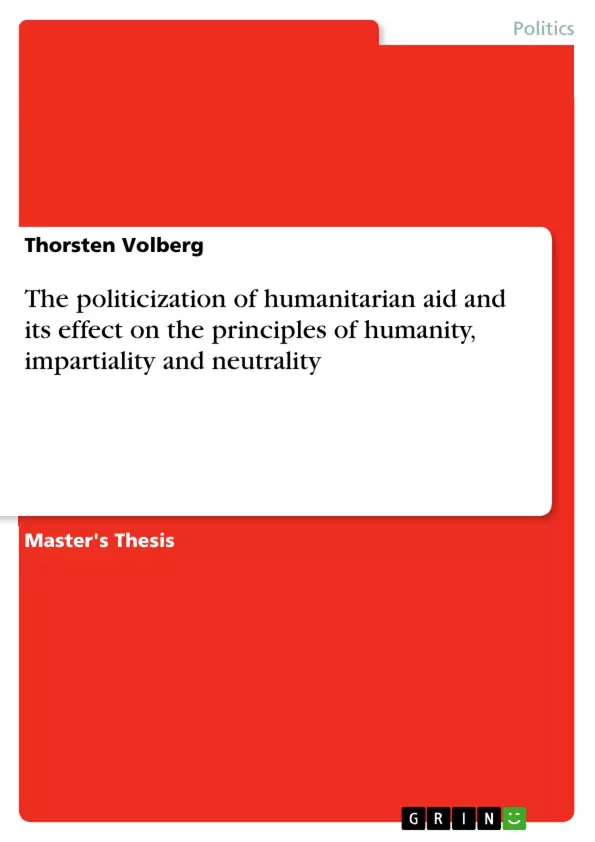The humanitarian principles of humanity, neutrality and impartiality provide an ethical framework that defines and delineates the humanitarian space within which relief agencies are supposed to operate. Current experiences, however, show that these traditional principles were not designed to cope with the development underlying the increasing merging of humanitarian aid and politics. To avoid political manipulation, relief organizations must rethink these traditional principles and face the responsibility of getting more involved in the broader political arena to be able to take appropriate action, and to avoid longterm damages on a society.
The ‘Sphere’ project, which was launched to improve the quality of humanitarian action and to put relief aid on a legal basis as set forth by international law, acknowledges the dependence of humanitarian aid on external political decisions. Still, it emphasizes traditional principles and expresses agencies’ commitment to act in accordance with them. ‘Sphere’s actual value must therefore be seen in defining a common basis around which agencies, donors and governing authorities can potentially agree on. It provides a basis for defining core humanitarian responsibilities that recognizes the limits of humanitarian action, while setting an agenda for individual and collective action.
Even though the attempt to define humanitarian principles that serve as blueprints in every global emergency for all humanitarian organizations does not seem to be achievable, the importance of ethical guidelines and benchmarks still exists. The heterogeneity of relief work is just a phenomenon, which is based in the nature of humanitarianism and this will always put a stamp on attempts to find common standards, principles and codes.
Inhaltsverzeichnis (Table of Contents)
- List of acronyms
- Abstract
- Introduction
- Introduction to the topic
- Methodology
- Setup of paper
- The humanitarian sphere
- Humanitarian threats
- Natural disasters
- Complex emergencies
- Environment of humanitarian response
- Principles and standards
- The 'Red Cross Code of Conduct'
- The 'Sphere' project
- 'Sphere' minimum standards
- 'Humanitarian Charter' and humanitarian principles
- Humanitarian threats
- The political environment of humanitarian aid
- Western humanitarian aid
- Influence of Western foreign policy
- Perception of Western NGOs
- Faith based NGOs
- External involvement
- Donor influence on humanitarian aid
- Donor activities and 'Sphere'
- Bilaterization of humanitarian aid
- Responsibilities of host governments
- Host governments and 'Sphere'
- Difficulties of governmental interaction
- Conflict regions
- Humanitarian agencies in conflict regions
- Local armed forces
- Military involvement
- Donor influence on humanitarian aid
- Western humanitarian aid
- Humanitarian principles in a political environment
- Humanity
- Impartiality
- Neutrality
- Controversies surrounding neutrality
- Neutrality and local politics
- Ambiguous approach of principles
- Afghanistan
- Serbia
- Iraq
- Solidarity
Zielsetzung und Themenschwerpunkte (Objectives and Key Themes)
This paper examines the increasing politicization of humanitarian aid and its impact on the traditional principles of humanity, impartiality, and neutrality. The author explores how these principles, designed for a different context, are struggling to navigate the complex political landscape of modern humanitarian interventions. The paper aims to highlight the challenges posed by political influence and propose ways to ensure effective and ethical humanitarian action in a politically charged environment.
- The evolving relationship between humanitarian aid and politics
- The impact of political influence on humanitarian principles
- The role of Western foreign policy in shaping humanitarian interventions
- The challenges faced by humanitarian agencies in conflict zones
- The need for ethical guidelines and benchmarks in humanitarian action
Zusammenfassung der Kapitel (Chapter Summaries)
- Introduction: This chapter provides a general overview of the topic, outlining the challenges posed by the politicization of humanitarian aid and the need to re-evaluate traditional principles in light of these challenges. The chapter also details the methodology and structure of the paper.
- The Humanitarian Sphere: This chapter examines the environment in which humanitarian aid operates, including the different types of humanitarian threats, the complexities of humanitarian response, and the fundamental principles and standards that guide humanitarian action. It introduces the 'Red Cross Code of Conduct' and the 'Sphere' project, both of which aim to improve the quality of humanitarian aid and ensure compliance with international law.
- The Political Environment of Humanitarian Aid: This chapter delves into the political context of humanitarian aid, focusing on the influence of Western foreign policy and the role of donors in shaping the direction of aid. It examines the perceived bias of Western NGOs, the increasing involvement of faith-based organizations in humanitarian work, and the responsibilities of host governments in coordinating and managing aid efforts. The chapter concludes by discussing the challenges of providing humanitarian assistance in conflict zones.
- Humanitarian Principles in a Political Environment: This chapter critically analyzes the application of humanitarian principles – humanity, impartiality, and neutrality – in a politically charged environment. It explores the controversies surrounding neutrality, the difficulties of maintaining impartiality in local politics, and the ambiguous approach to principle application in specific contexts. The chapter examines the concept of solidarity as a potential complement to the existing principles.
Schlüsselwörter (Keywords)
Key terms and concepts in this paper include humanitarian aid, politicization, humanitarian principles, humanity, impartiality, neutrality, solidarity, Western foreign policy, donor influence, conflict zones, 'Sphere' project, 'Red Cross Code of Conduct', complex emergencies, and ethical guidelines.
- Citation du texte
- Thorsten Volberg (Auteur), 2006, The politicization of humanitarian aid and its effect on the principles of humanity, impartiality and neutrality, Munich, GRIN Verlag, https://www.grin.com/document/67908



